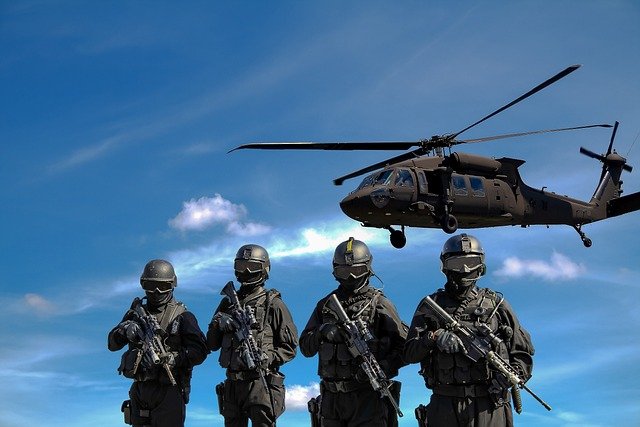PMCs and Wagner Group
Alright, my friend, buckle up. Let’s imagine we’re right in the middle of an action-packed blockbuster movie.
You know those mercenaries you see in action flicks? The guys who show up out of nowhere, suited in cool gear, armed to the teeth, knowing how to fly choppers, diffuse bombs, and blend into the crowd? That’s more or less what private military companies (PMCs) are like in real life. They’re essentially hired guns, but instead of being lone wolves, they’re organized groups that provide military services for money.
Now, what roles do they play? Well, think of them like the Swiss army knives of the military world. They can take on a range of roles – from providing security and training local forces to engaging directly in combat and even intelligence gathering. A government, corporation, or any entity with a deep pocket can hire them.
Take the Wagner Group, for example. These guys are like the “Phantom Menace” of the PMC world. Officially, they don’t exist, but unofficial reports tell us a different story. They are allegedly a Russian-based PMC, rumored to be backed by Yevgeny Prigozhin, a close associate of Putin. Wagner has been implicated in conflicts in Syria, Libya, Ukraine, and parts of Africa, usually taking sides that align with Russian interests.
The advantages of using a PMC like Wagner are many. For governments, PMCs offer plausible deniability. If a group of armed men show up in a conflict zone, the government can say, “Who, us? No, those are private contractors!” Also, PMCs are often cheaper and more flexible than traditional military forces. They can be deployed rapidly, and their contracts can be terminated when their tasks are finished, which makes them pretty convenient.
However, it’s not all rainbows and unicorns. The downside is that PMCs often operate in a legal grey area. Many have been accused of human rights abuses and war crimes. Also, since they’re profit-driven, there’s a risk they might prioritize their bottom line over the well-being of the local population.
As for training, it varies among PMCs. Some, like the Wagner Group, often recruit ex-military personnel, which means they come with skills honed on the battlefield. Others might run their own training programs, similar to military boot camps but typically more specialized.
And who supplies their gear? Well, this is a murky area. Sometimes, it’s the clients themselves. Other times, they might purchase equipment on the open market or even from shadowy arms dealers. Wagner Group, being allegedly linked to the Russian state, is rumored to have access to advanced Russian military equipment.
In the end, the world of PMCs is as fascinating as it is controversial. They’re like the invisible hand in global conflicts, always there, but rarely seen or acknowledged. The Wagner Group, with its cloak-and-dagger operations, is a prime example of this shadowy world. Remember though, these are no superheroes. They’re just humans, like us, caught up in the larger machinations of global power games.
Can Wagner Group Lead A Coup Against Putin And Take Over Russia?
The Wagner Group, as we discussed, is a Private Military Company (PMC) reportedly composed of ex-Russian military personnel and is rumored to be backed by Yevgeny Prigozhin, a man with close ties to Putin. This would mean the Wagner Group has significant resources at its disposal, including experienced military personnel, heavy weaponry, and possible insiders within the Russian government.
Now, can they stage a coup against Putin? Theoretically, yes. With enough disgruntled military personnel and insiders, they could potentially attempt to seize power. They could exploit a crisis or cause chaos to distract the government and make their move. The current Russia-Ukraine war is a crisis situation which can be exploited by the Wagner group.
However, it’s crucial to note that a successful coup is about more than just military power. They would also need considerable political support within the government and public to sustain power after the coup. This is a substantial challenge, as Putin has been a dominant political figure in Russia for many years, and removing him would create a massive power vacuum that would be hard to fill without significant public and institutional support.
Additionally, the Russian security services are highly capable and loyal to Putin. The Federal Security Service (FSB) and the Foreign Intelligence Service (SVR) would likely detect any serious coup attempt before it could get off the ground. If the Wagner Group were to move against Putin, they would have to contend with these agencies, which would be no easy task.
Furthermore, PMCs like the Wagner Group typically operate in the shadows, outside the public eye. Staging a coup would thrust them into the spotlight and expose them to international scrutiny and sanctions. Even if the coup were successful, the international community would likely not recognize the new government, making governing very difficult.
Overall, while theoretically possible, the odds of the Wagner Group successfully staging a coup against Putin are extremely low. The combination of Putin’s entrenched power, the formidable capabilities of Russian security services, and the international consequences make it highly unlikely.
Author: Colonel Alexander “Alex” Kuznetsov
Colonel Alexander Kuznetsov, known to friends and colleagues as “Alex,” is a distinguished retired officer of the Russian Armed Forces. With a career spanning three decades, Kuznetsov has seen the evolution of warfare firsthand and served in numerous conflict zones around the globe.









